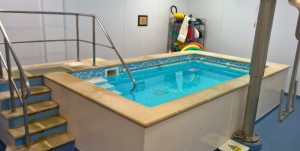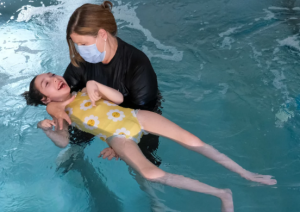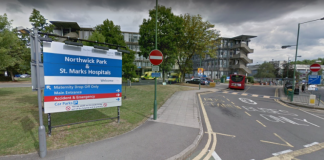For several years, Linda Green has been going to weekly physio sessions in the hydrotherapy pool at Northwick Park Hospital to aid her recovery following two hip operations.
She said: “When you do exercises in a pool you can do really strenuous exercises and not feel like you are, it’s much easier. “I feel secure, you’re not going to fall over because the water supports you.”
However, a recent announcement by London North West University Hospital (LNWUH) – the Trust in charge of Northwick Park – that the pool is set to close at the end of the month has left Linda, and many other regular users, shocked and concerned about how they will be able to continue accessing this specialised care.
The on-site hydrotherapy pool at Northwick Park Hospital, located on Watford Road on the border of Brent and Harrow, has been a vital facility for people with chronic pain and discomfort across London for the past 40 years.
The pool is primarily used by patients with arthritis, various musculoskeletal problems, and those recovering from orthopaedic surgery. Also known as aquatic therapy, the combination of warm water, buoyancy, and massage jets can be used to help reduce pain, improve muscle relaxation, increase range of motion, and strengthen muscles.
LNWUH said the new NHS plan makes “a clear distinction” between facilities that should be provided in acute hospitals with those “best provided by community services” and claims the pool is currently “mostly used by private users”.

Image: University Hospitals Dorset NHS Foundation Trust
This is disputed by Linda. She told the Local Democracy Reporting Service (LDRS) that patients get referred for sessions by either a GP, a hospital consultant or a physiotherapist in the Trust. From there, patients get three free sessions before having to pay £7 for a half an hour slot, which Linda likens to still having to pay to see an NHS dentist.
She said: “You are not sent there as a private patient. None of us see ourselves as private users, we’ve all been referred there with medical conditions by medical professionals.”
Linda has been referred twice after undergoing hip operations, with the exercises designed to strengthen the whole body and improve balance. She said: “What they absolutely don’t want you to do is fall. When you have hip operations your replacement hip is never as good as a real biological one, it could fracture.
“You can’t just do that for a few weeks and leave it, you have to go on. The consistency helps me keep to a regular exercise regime so I feel that I am a lot stronger. I don’t really know which exercises I would do for my legs every day that are the same as in the pool – it’s very hard to keep it up when you’re not being supervised.”
A huge concern amongst patients is that there are no similar facilities nearby. Linda said that she gets nervous in ordinary public swimming pools as they are crowded and divided into lanes with no designated area for exercising. There is a suitable pool at Stanmore Hospital but it doesn’t run a service with physiotherapists and Linda doesn’t know whether they would even “have the capacity to take on all these patients from Northwick Park”.
One of those who would need to find another facility is 80-year-old Pat Tring, who suffers with arthritis and spondylolisthesis – caused by a vertebrae slipping out of alignment and pressing down on the vertebra below it.
Pat attended a weekly chronic lower limb exercise class at the hospital following a hip replacement in 2011, before joining the spinal hydrotherapy class in 2021. After being diagnosed with a brain tumour in 2022, she claims she was unable to continue with the lower limb class due to her difficult maintaining balance meant the apparatus was too dangerous to use. However, she was still able to attend hydrotherapy.
Speaking to the LDRS, Pat said: “My Husband takes me to my weekly hydrotherapy as I am in a purpose built safe unit with a physiotherapist who is helping to keep me mobile. I have no other option.
“I do my exercises at home every day but my weekly half an hour in the pool is so precious and important on an exercise and social aspect. It is so frustrating being so much less independent, [the pool] is one area where I can help myself to keep mobile to the best of my ability now.”
Linda claims the decision wasn’t communicated with patients at all and first learnt about it via an online petition. In fact, the musculoskeletal physiotherapy team at the hospital have lodged a collective formal grievance against the Trust’s procedure, criticising a “lack of transparency” and a “failure to be truthful and open”.
In a letter sent to the Trust CEO, Pippa Nightingale, they state: “It appears that a decision has been made to close the pool, with attempts made to retrospectively justify this, without meaningful analysis or consultation carried out.”
The letter decries a “lack of transparency demonstrated by the Executive Team” in reaching

Image: Innova Care Concept
the decision, as well as a “lack of due diligence in establishing the true impact of this decision”. It adds: “We believe the Trust to have failed to be truthful and open – and have explicitly instructed staff to not tell patients.
“Of particular importance is the lack of honesty in communicating with the public, the inequitable treatment of patients with disabilities for whom hydrotherapy may represent their only safe and effective form of exercise
Whilst acknowledging that the decision to close the pool ultimately rests with NWLUH NHS Trust, Brent Council Leader, Cllr Muhammed Butt, has said he “shares [the] alarm” about the impact the closure may have on residents who have “come to rely on this valuable service”.
In an email to a resident, Cllr Butt wrote: “Our Lead Member for Public Health and Adult Social Care, Cllr Neil Nerva, will be reaching out to the Trust to gain a clearer understanding of the rationale behind this decision and to learn what, if any, mitigating measures are being considered. We firmly believe that the voices of patients, staff, and the wider community should be taken into account in any major changes to local health services.
“Additionally, Barry Gardiner MP is raising this issue at the highest levels within the NHS, following representations from concerned residents and stakeholders. We welcome this intervention and will remain in close contact with him to support efforts to ensure there is proper engagement and consideration of alternative solutions.”
Both Pat and Linda would rather pay a bit more and keep the pool running as it is, however, despite the concerns raised the Trust appears to be moving ahead with the closure. It claims the majority of hospitals do not offer hydrotherapy because it has “long been acknowledged as a community run service” and Northwick Park are belatedly closing the pool due to “national spending targets”.
The Trust points to the “time constraints” placed on it to make these savings meant the closure has been agreed by “internal processes” and has since written to its local authority partners to explain the situation, as well as giving pool users “the opportunity to attend engagement meetings”.
A LNWH spokesperson said: “We respect that the decision to close the hydrotherapy pool has been upsetting for some users and colleagues, but we do not have the luxury of focusing on one service to the exclusion of all the others provided by LNWH. We have to consider the position of our whole organisation and must give priority to acute services already operating under great pressure with limited resources.
“NHS patients are referred by internal consultants for physiotherapy which may or may not include hydrotherapy. Physiotherapists assess whether the patient may benefit from hydrotherapy and up to four sessions in the pool are provided as part of that care. Some people may choose to either take up the availability of ongoing exercise classes in the pool for a fee or are sign-posted to other local pools for water exercise options.
“If someone chooses to continue hydrotherapy classes, that is their decision, as is the case for any number of other kinds of service, but they are not under NHS care if they choose to do so.
“LNWH is being accountable and responsible by making tough decisions that will safeguard core services; has been honest about telling staff and pool users about what is happening; is working as a team to make things work across the whole organisation; and doing its best to ensure there is equity in those services for NHS patients.”




